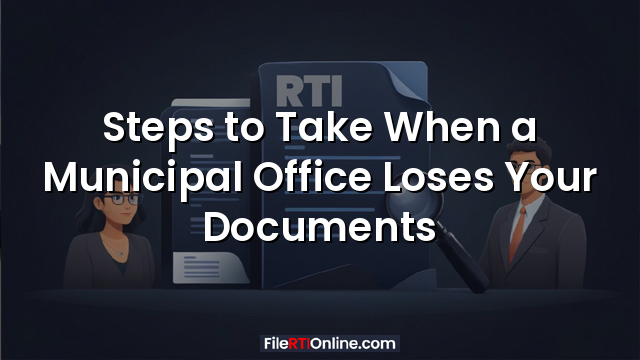Steps to Take When a Municipal Office Loses Your Documents (With Real CIC Case Example)
Losing important documents is one of the most common and frustrating issues citizens face in municipal offices. Whether it involves medical claims, property papers, licenses, tax records, birth certificates, or pension files, the burden often shifts unfairly onto the citizen.
However, Indian law, especially the Right to Information (RTI) Act, provides clear remedies to address such negligence. This guide explains exactly what you should do when a municipal office loses your documents, along with a real Central Information Commission (CIC) case that shows how citizens can ensure accountability and even receive compensation.
1. Gather All Evidence of Submission
Before initiating any action, collect all possible proof that you submitted the documents. This includes:
· Acknowledgement receipts
· Diary numbers
· Online submission IDs
· Copies of emails sent to the department
· Proof of dispatch (speed post, registered post)
· Names and designations of officers who received your documents
Even informal notes like the date of visit and the name of the receiving official can help establish that the documents were indeed handed over.
This step is crucial because the burden should not fall on the citizen once the office has taken custody of the file.
2. Ask the Department for a Written Status Update
Visit the municipal office and ask for:
· The current status of your file
· The name of the officer handling the matter
· The file number or movement number
· Expected processing time
If the officer verbally informs you that the file is “missing” or “misplaced”, request written confirmation. Even if they refuse to issue a written response, this interaction becomes relevant for your RTI application.
3. File an RTI Application to Trace the Missing File
RTI is the most effective legal tool when government documents are lost. It forces the department to place facts on record and disclose:
· The current status of your file
· Names of the officers who handled it
· File movement details
· The point at which the file went missing
· Whether an inquiry was initiated
Your RTI should specifically ask for:
1. Current status of your application or claim
2. Certified copies of file movement register entries
3. Name and designation of the officer responsible for the file
4. Whether the file has been lost, misplaced, or damaged
5. Copies of inquiries initiated into the loss
6. Time required to reconstruct the file
Once an RTI is filed, departments are legally bound to respond within 30 days.
4. Demand Reconstruction of the File
If the office admits that the file is lost, they must reconstruct it at the earliest. This often requires:
· Re-submitting photocopies of documents
· Getting fresh signatures from doctors or officials
· Re-filing the application
Citizens cannot be penalized with additional fees or paperwork due to departmental negligence. You have the right to demand prompt reconstruction without repeated visits.
5. Identify the Deemed PIO Responsible for the File
Under Sections 5(4) and 5(5) of the RTI Act, the officer who holds or processes the information becomes the “Deemed Public Information Officer”.
This is important because:
· They become legally responsible for providing the information
· They may face penalties under Section 20 if information is withheld
· Accountability can be fixed even if the original file is lost
This concept becomes significant in appeal proceedings before the CIC.
6. Seek a Copy of the Inquiry Report
Whenever a government file is lost, an internal enquiry must be conducted. You are entitled to:
· Copies of the enquiry report
· Details of disciplinary action taken
· Explanation of how the file went missing
· Measures taken to prevent future incidents
If the enquiry is still underway, the report must be given once completed.
7. Claim Compensation for Harassment and Loss
Under Section 19(8)(b) of the RTI Act, the CIC or SIC can order compensation for:
· Mental harassment
· Inconvenience
· Financial detriment
· Time and effort spent reconstructing the file
Citizens often do not know this, but compensation is a legally recognized remedy when departments act negligently.
Real Case Example: SDMC Loses Medical Claim File and CIC Awards Compensation
A practical illustration of these steps comes from a Central Information Commission decision involving the South Delhi Municipal Corporation (SDMC).
Background
The appellant filed an RTI seeking details about the action taken on her medical claim (Form No. 97) amounting to Rs. 20,586. She wanted to know the current status and why her reimbursement was delayed.
During the hearing, the SDMC admitted that the entire file related to the medical claim of the appellant’s husband had been lost. The appellant was forced to:
· Collect photocopies of all medical documents again
· Obtain doctors’ signatures a second time
· Make multiple visits to the department
SDMC stated that the file had been reconstructed and submitted to the Chief Administrative Medical Officer (CAMO), who returned it with objections. After rectification, the file was resubmitted to the CAMO for sanction.
CIC’s Observations
The Commission held that:
· Since the reconstructed file was pending with the CAMO, he was the Deemed PIO under Sections 5(4) and 5(5).
· The CAMO must provide the current status of the case to the appellant.
· The public authority caused mental anguish and harassment the original file.
· Delayed reimbursement caused financial detriment.
The CIC directed the PIO/Deputy Director of the Horticulture Department to provide the outcome of the inquiry into the missing file.
Compensation Awarded
Under Section 19(8)(b), the Commission awarded Rs. 2,000 as compensation for:
· Mental harassment
· Delay in processing
· Financial inconvenience
· Negligence of the officer responsible for safe custody of the file
This case shows that departments can be held accountable and citizens can seek remedies when files go missing.
8. Escalate Through RTI First and Second Appeals If Needed
If the PIO does not respond or provides incomplete information:
· File a First Appeal with the First Appellate Authority
· If dissatisfaction continues, file a Second Appeal or Complaint with the CIC/SIC
The Commission has the authority to:
· Direct the department to reconstruct the file
· Fix accountability on officers
· Impose penalties
· Order compensation
· Direct immediate action on pending claims
9. Submit a Formal Complaint to Senior Officers
If the issue continues despite RTI action, you may write to:
· Municipal Commissioner
· Joint Commissioner
· Director of the concerned department
Explain the negligence, delays, and inconvenience caused. Written complaints often speed up administrative action.
10. Prevent Future Losses of Your Documents
To avoid similar issues:
· Always scan your documents before submission
· Send documents email and physical copy
· Maintain proof of submission
· Demand acknowledgment
· Track file numbers regularly
· Use RTI promptly if communication stops
Proactive documentation protects you against bureaucratic lapses.
Conclusion
When municipal offices lose documents, citizens must not bear the consequences. Through a combination of documentation, RTI applications, enquiries, and escalation, you can not only get your file reconstructed or your claim processed but also seek compensation for the inconvenience caused.
The SDMC case demonstrates that even when an entire medical claim file is lost, the CIC can hold officers accountable, direct reconstruction, ensure payment, and award compensation.


